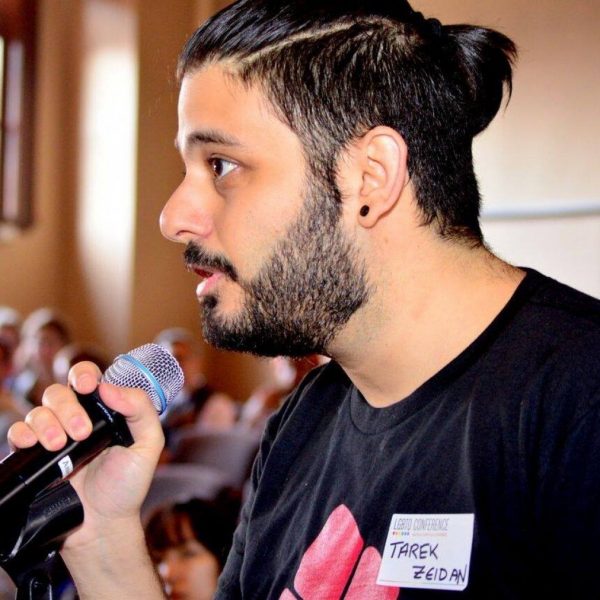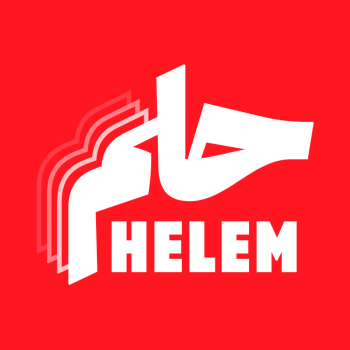This month, the Consortium for Elections and Political Process Strengthening (CEPPS) is celebrating #CEPPSGlobalPride! In support of our global commitment to the empowerment and inclusion of marginalized populations in political processes, we’re recognizing the essential work of CEPPS partners to support lesbian, gay, bisexual, transgender and intersex (LGBTI) inclusion and equality. In this series, we are highlighting some of our partners around the world who are at the forefront of fighting for LGBTI equality and inclusion in democracy and governance.
To wrap-up the series, NDI interviewed Tarek Zeidan (he/his), Executive Director and Founder of Helem, a partner in Lebanon advocating for LGBTI equality. He told us about how his organization is protecting and empowering LGBTI people in Lebanon by providing legal and social services, along with emergency intervention and refugee support. They are helping the LGBTI community build power and capacity.

The main challenges that LGBTI communities in Lebanon face include violations of their civil and economic rights, such as arbitrary arrest, detention and violence by security forces. These communities face extreme forms of discrimination and harassment from multiple sources including government institutions, health providers, the majority of educational institutions and in the workplace. Discrimination comes in the form of laws that are used to target LGBTI communities, as well as a complete lack of any form of legal or policy protection in any of the above-mentioned areas. There are no non-commercial safe spaces for LGBTI individuals in Lebanon. Helem’s community center is one place where individuals can be without fear of harassment or discrimination, and can focus on healing and building community power.
Recently, the roster of challenges facing the community has grown exponentially with the advent of the economic and political crisis in Lebanon, as well as the COVID-19 pandemic. The latter awakened previously dormant challenges and exacerbated existing ones tenfold, blatantly exposing the gaps, and institutionalized homophobia and transphobia in government institutions and the humanitarian aid system. International organizations, UN agencies and local efforts proved to be completely incapable of including LGBTI populations into their programs or relief efforts. Members of our community were repeatedly denied aid, food and shelter because they did not conform to established gender binary norms and what a nuclear family should look like. At the moment, the community is struggling with food insecurity, particularly nutritional hunger; lack of access to medication; increasing numbers of evictions and homelessness; staggering unemployment and workplace exploitation; as well as rapidly rising levels of domestic abuse and deteriorating mental health.

Helem has traditionally been the last and only resort for LGBTI people facing detention and incarceration. Our protection department specializes in providing legal aid and representation to detained community members, as well as abuse intervention and emergency response. We also have worked with the judiciary for more than a decade resulting in seven landmark decisions in Lebanese courts in favor of decriminalizing same-sex relations from the penal code. We work with allies from the labor, migrant and disability rights movements on labor law reform and workplace equality. We concentrate on youth empowerment, and have programs that specifically target reform within homophobic and transphobic institutions using a unique workshop method developed by Helem. Lately, Helem has faced the challenge posed by the COVID-19 pandemic head on by providing rent support and food aid, feeding more than 1,000 individuals via a sustainable community kitchen. We also negotiated the first-ever free clinic for LGBTI individuals with the American University of Beirut Medical Center, and are working on establishing the first-ever professional and sustainable LGBTI shelter in Lebanon.
Political participation for LGBTI individuals in Lebanon has been a persistent challenge, as LGBTI concerns and issues are rarely debated in the public sphere. These challenges have only been exacerbated by the pandemic. There are barriers for members of our trans community to exercise their right to vote, protest and run for office due to difficulties in changing their gender markers. In addition, individuals who are transgender or gender non-conforming are frequently targeted due to their non-normative appearance and behavior, making it difficult and dangerous to participate in public life. The October Revolution in 2019 was one of the first-ever instances when LGBTI people were highly visible and mobilized, en masse, for larger political purposes beyond LGBTI-related demands to push for government accountability, anti-corruption, and social and economic rights. The government continued to ignore our presence and our rights as citizens and non-citizens living in Lebanon. However, many civil society organizations and the international community noticed this political debut and, as a result, have begun to make serious efforts at including LGBTI individuals, voices, perspectives and resources into their future planning.
The COVID-19 pandemic, as mentioned before, really exposed a glaring gap in existing systems around the world in ensuring that marginalized communities are not forgotten. The data and work Helem was able to quickly mobilize to address the above challenges of the pandemic really brought the organization to the attention of UN agencies working in Lebanon who are now being more intentional about including LGBTI concerns and nuances into their programming. Larger humanitarian and development organizations also recognized LGBTI communities as at risk and disproportionately represented in their work, and are beginning to think of how to better address LGBTI needs. This provides an opportunity to stake a claim in previously inaccessible spaces — to change systems from within and never look back. The necessity to band together with both international and local actors has given Helem and, LGBTI communities more broadly, previously unheard of access to municipalities, community centers, educational institutions, health providers, government representatives and private sector actors. These stakeholders have all been keen to know more, and change their policies and procedures to reflect the values and priorities of an emerging generation committed to diversity and inclusion. Regrettably, the opportunity for change flourishes in a crisis more than any other time. Balancing the need to protect with the need to push forward is key to sustainable change.
Pride has always meant visibility, power and defiance to Helem. We honor the spirit of the first Pride — the riots at Stonewall Inn in 1969 — for the diverse, inclusive and spontaneous explosion of outrage and solidarity that shaped the past 50 years of LGBTI activism. The October Revolution was our first real Pride in Lebanon, and Helem’s participation in it is a testament to our long and difficult history. We are builders of communities, but every proud edifice must first break ground before it can rise. We are emerging to reclaim a storied past of sexual diversity and liberation obscured by dogmatism, colonialism and the passage of time. Our pride is in how many authors we have graduated to write this great story.
—
View original post at NDI.org